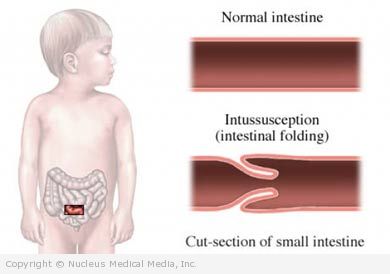Intussusception – Definition
Intussusception is a very serious type of bowel obstruction. It occurs in up to 4 in 1000 live births. The bowel (also called intestine) is shaped like a long tube. Intussusception occurs when a part of the bowel “telescopes” in on itself and is trapped by an adjacent portion of the small or large intestine. This causes swelling and obstruction, cutting off the blood supply to the intestine.
Intussusception – Causes
In many cases, there is no known cause for intussusception. However, intussusception may sometimes occur as a complication of some medical conditions, including:
- Viral infections (especially adenovirus)
- Meckel’s diverticulum
- Intestinal polyps
- Tumors, such as lymphosarcoma and neurofibroma
- Lymphoma
- Cystic fibrosis
- Recent abdominal surgery
- Henoch-Schonlein purpura
- Inflammatory bowel disease
- Hemophilia
- Hemangioma
Intussusception – Risk Factors
A risk factor is something that increases your chance of getting a disease or condition.
Risk factors include:
- Age: it is the most common cause of obstruction in children 3 months to 6 years old, but the majority are younger than 24 months.
- Season: more common during respiratory and gastrointestinal virus seasons.
- Sex: male
- Medical conditions in the list above
Intussusception – Symptoms
The initial symptoms may include:
- Abdominal pain
- Usually severe
- Colicky or cramping
- Usually comes on suddenly
- In children, this may be indicated by drawing knees to chest and crying.
- Vomiting (sometimes yellow or green tinged)
- Stools mixed with mucus and blood (often described as currant jelly)
- Lethargy
Additional symptoms include:
- Poor feeding
- Diarrhea
- Shock
- Dehydration
- Fever
Intussusception cuts off the blood supply to the bowel. If this is not treated quickly, it can lead to bowel gangrene. Gangrene can cause tissue in the intestinal wall to die. This may lead to:
- Perforation of the intestinal wall
- Peritonitis (inflammation of the lining of the abdominal cavity) and infection
If not treated quickly, peritonitis can lead to death.
Intussusception – Diagnosis
The doctor will ask about your symptoms and medical history, and perform a physical exam. Tests may include:
- Blood and urine tests
- Fecal occult blood test, which checks the stool for blood
- Abdominal x-ray, ultrasound, or CT scan
Intussusception – Treatment
Air Enema
In many cases, giving an air enema will correct intussusception. Air enema is preferred over water-soluble contrast or barium enema. This is often the preferred treatment when intussusception occurs in infancy. However, the test may occasionally cause a perforation to occur in the bowel. No form of enema should be done if the doctors know the bowel is perforated.
Surgery
Surgery may be required to release the trapped portion of the bowel and to clear the obstruction. If any bowel tissue has died due to gangrene, that part of the bowel may need to be removed.
After any treatment, intussusception may recur.
Antibiotics may be administered and a nasogastric tube placed prior to attempted reduction.
If you are diagnosed with intussusception, follow your doctor’s instructions.
Intussusception – Prevention
There are no guidelines for preventing intussusception because the cause is unknown.

